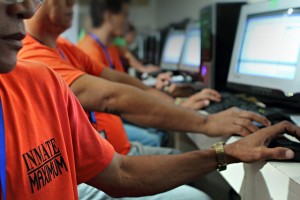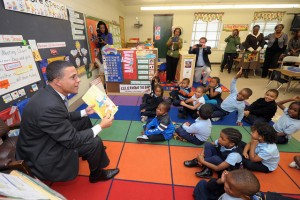Over the past four decades, the United States has sent astonishingly high numbers of its citizens to prison—especially poor minority men. The price has been paid not just by the imprisoned men themselves, but also by their communities and families, including very young children.
On any given day, approximately 2.7 million children are estimated to have a parent in prison or jail. When we also take into account children who have fathers previously in jail or prison, it turns out that nearly one of every ten U.S. residents under 18 has been affected by parental imprisonment. Researchers like me are just beginning to look into the impact of fathers’ imprisonment on children’s preparation to learn when they start attending school. For all American children, doing well at school is crucial. Early gaps lead to growing inequalities in U.S. society as a whole.

Why School Readiness Matters
“School readiness” is an idea developed by scholars to indicate how well prepared pre-school children are to learn in formal classrooms. It refers both to cognitive skills—such as understanding words and numbers and the ability to solve problems—and to such behavioral skills as the ability to pay attention, follow directions, and control emotions like anger or frustration.
- For very young children, such cognitive and behavioral readiness skills have been found to influence success in kindergarten and early grades.
- School readiness also turns out to have a lingering effect on how young people will do many years later, after they leave school and go to college or look for jobs.
- School readiness influences decisions by teachers and school counselors—such as whether to assign children to special education classes. In turn, such early decisions affect children’s later paths and opportunities in school and life.
How Fathers’ Imprisonment Affects School Readiness for Five-Year-Olds

Why might paternal incarceration affect school readiness? Several things can happen. Children can be traumatized by separation or by the social stigma of having a parent sent to prison. As a result, they may become more likely to experience emotional or behavioral problems or suffer from setbacks in physical or mental health. My study probed such possibilities by tracking development for a large sample of urban U.S. children and their parents. For all the children in the study, I knew about economic factors, neighborhood conditions, and parental characteristics and behaviors that could lead children to be more or less ready for school. Looking at children who in other ways were similarly at risk for poor school readiness, I compared children whose fathers did not go to prison with children who experienced having their fathers sent to prison for the first time between ages one and five. I found some important things:
- Paternal incarceration does not have any clear-cut effects on children’s cognitive readiness for school. But it does hurt young children’s emotional and behavioral readiness—and the setback is equivalent to a loss of nearly two months of schooling. Children of imprisoned fathers are set back when they arrive at kindergarten not fully able to pay attention or obey teachers or are more likely than other youngsters to be hyperactive, aggressive, or easily frustrated.
- Boys were the ones set back the most by such emotional and behavioral unreadiness—which helps to explain why, overall, researchers find that boys are less prepared for school than girls.
- Having a father sent to prison leads to similar setbacks for both white and black children—but of course black children are much more likely to have their fathers imprisoned.
Special Education Placements and Later Problems
The harmful impacts of paternal incarceration on school readiness at age five also matter for the longer run, especially because emotionally and behaviorally unprepared boys are often assigned to special education classrooms. I found that boys whose fathers are incarcerated during their pre-school years are more likely to be placed in special education by age nine.
Special education placement, in turn, has been linked to later shortfalls in academic achievement, so these assignments help to explain why black boys fall behind. Research has shown children placed in special education have a higher incidence of dropping out of school and are more likely to get in trouble with the law or end up unemployed. Vicious circles of failure for boys and men can get perpetuated across the generations.
Larger Implications and Possible Remedies

My research shows that a significant part of the difficulty U.S. black boys face in school is traceable to having so many of their fathers in prison. We can, in short, add yet another unintended problem to the list of damages mass imprisonment has inflicted on American society. Simply stated, the prison boom of recent times turns out to perpetuate disadvantages from fathers to sons, because it undercuts boys’ readiness to pay attention and control their emotions at school. Because black fathers are the ones most likely to be sent to prison, far too many black boys start the race of life well behind other children.
What can be done? Pre-school education programs can certainly help children get ready to succeed at school, and they can be designed to provide prisoners’ children the extra support they need. But preschool opportunities alone are unlikely to be enough, unless the United States finds alternatives to imprisonment for many offenders, so that fewer young men, especially minorities, are removed from their families and communities at a critical stage of life for their children. As Americans look for alternatives to prison, it makes sense to consider unfortunate side effects for the children of the incarcerated. Especially in poor black communities, imprisoning fewer fathers would reduce the number of American children, particularly boys, who through no fault of their own end up behind in life before they even get to the first day of school.
Read more in Anna R. Haskins, “Unintended Consequences: Effects of Paternal Incarceration on Child School Readiness and Later Special Education Placement,” Sociological Science 1:141-158.

 Research to Improve Policy: The Scholars Strategy Network seeks to improve public policy and strengthen democracy by organizing scholars working in America's colleges and universities. SSN's founding director is Theda Skocpol, Victor S. Thomas Professor of Government and Sociology at Harvard University.
Research to Improve Policy: The Scholars Strategy Network seeks to improve public policy and strengthen democracy by organizing scholars working in America's colleges and universities. SSN's founding director is Theda Skocpol, Victor S. Thomas Professor of Government and Sociology at Harvard University.
Comments 1
Jacobs — November 10, 2014
could this possibly have any connection to, conflict, transmission, and to labeling theory?